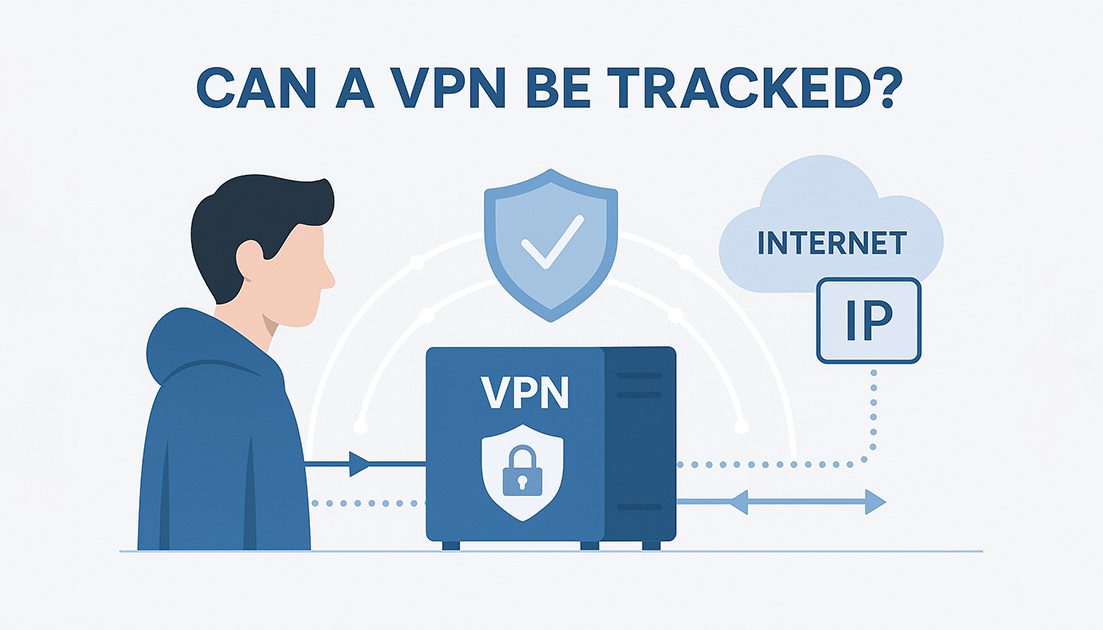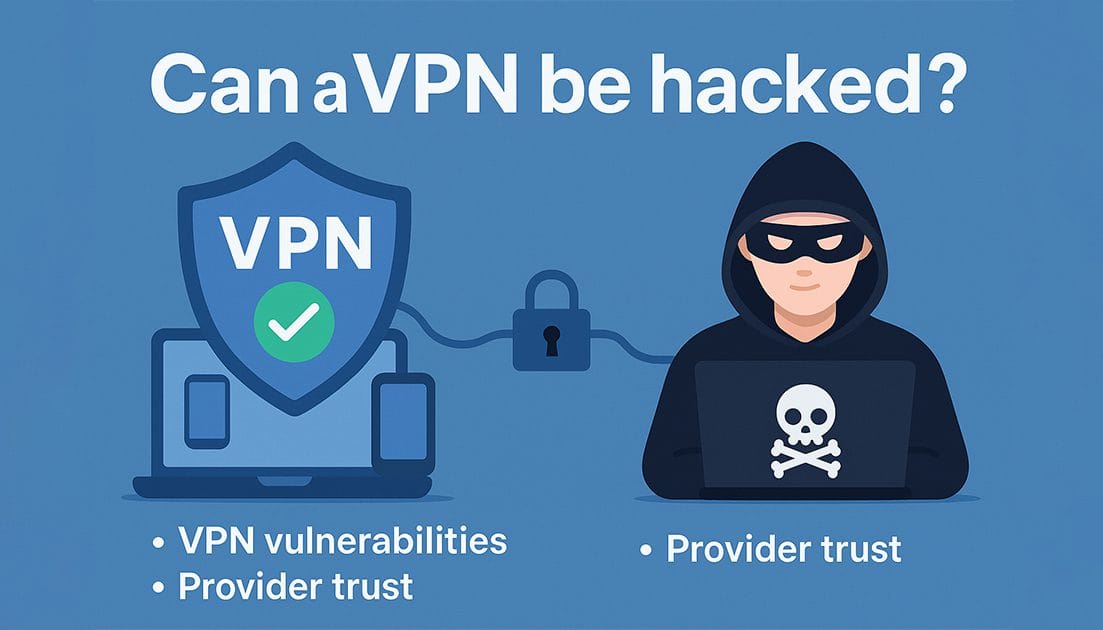VPNs have become essential tools for online privacy, helping users encrypt their data, bypass restrictions, and shield their activity from surveillance. But in some regions, governments see them as a threat leading many people to ask: can VPN be banned?
The answer isn’t black and white. While VPNs are legal in most countries, others have imposed restrictions or outright bans.
In this article, we’ll explore the legality of VPNs across different regions, why some countries ban them, how those bans are enforced, and whether you can still safely use a VPN where they’re restricted. Whether you’re traveling, living in a high-censorship region, or just curious, understanding the limits of VPN legality is crucial for staying safe and informed.
What Does It Mean to Ban a VPN?
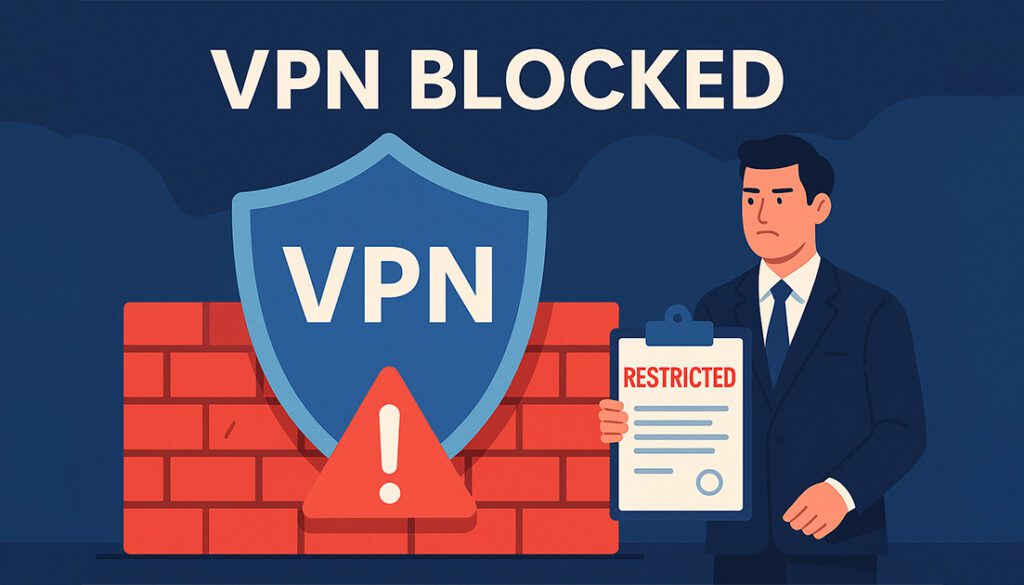
A VPN ban doesn’t always mean outright illegality. Instead, the term covers a range of restrictions that governments might use to control or limit VPN usage.
🔍 What a VPN Ban Can Actually Involve:
- 🚫 Blocking access to known VPN server IPs
- 📜 Requiring users to register or use state-approved VPNs
- ⚖️ Criminalizing unauthorized or unlicensed VPN use
- 📶 Disrupting VPN traffic using deep packet inspection (DPI)
- 💸 Fines or legal action against individuals or companies using unapproved services
In some countries, the goal is to maintain strict control over information, enforce censorship, or monitor dissent. In others, VPNs are restricted because they help users bypass content blocks, especially for foreign news, social media, or streaming platforms.
However, banning VPNs does not always mean VPNs are illegal. Often, they exist in a legal gray area where:
- The technology is not banned,
- But attempts are made to block its usage or pressure providers to shut down.
🚫 What a VPN Ban Might Include
❌ Blocking VPN server IPs❌ Requiring state-licensed VPNs
❌ Criminalizing VPN use
❌ Monitoring or disrupting encrypted traffic
❌ Penalizing users who bypass government firewalls
Why Do Countries Ban or Restrict VPNs?
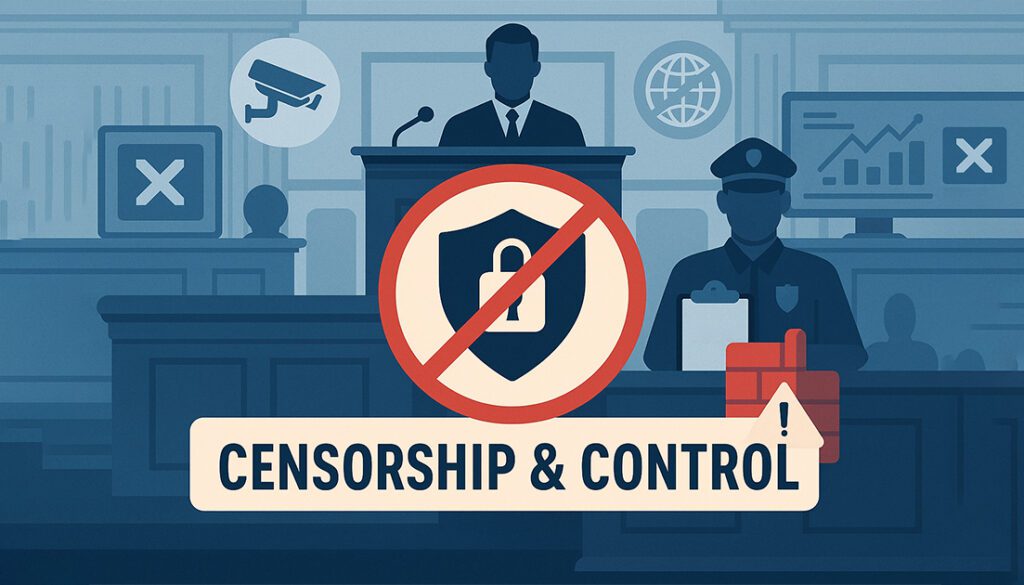
VPNs give users the power to encrypt their internet traffic, hide their IP address, and access content without geographic or political limits. While this is great for privacy, it’s exactly why some governments consider VPNs a threat.
Here are the most common reasons why certain countries ban or restrict VPN usage:
1. 🚫 Censorship Control
Authoritarian governments often use VPN bans to stop citizens from accessing foreign news, social media, or politically sensitive websites that challenge the regime.
2. 👁️ Surveillance and Monitoring
VPNs make it harder for governments to track internet usage. Banning them helps authorities monitor what people are doing online, especially during protests or periods of political unrest.
3. 💼 Content Licensing and Revenue Protection
Some countries restrict VPNs to protect broadcasting rights or national platforms. For example, users accessing Netflix libraries or sports content from other regions via VPN may violate local licensing laws.
4. 🕵️♂️ Cybercrime and Illegal Activities
While most people use VPNs for privacy, bad actors can also hide behind them to carry out hacking, fraud, or piracy. Governments may cite this as justification for imposing broad bans.
🛑 Top Reasons VPN Get Banned
🚫 To enforce censorship and block foreign media👁️ To maintain surveillance and monitor dissent
📺 To restrict access to geo-locked streaming or content
🕵️♂️ To combat online piracy and cybercrime
📉 To protect economic interests tied to licensing and regulation
Where Are VPN Banned or Restricted?
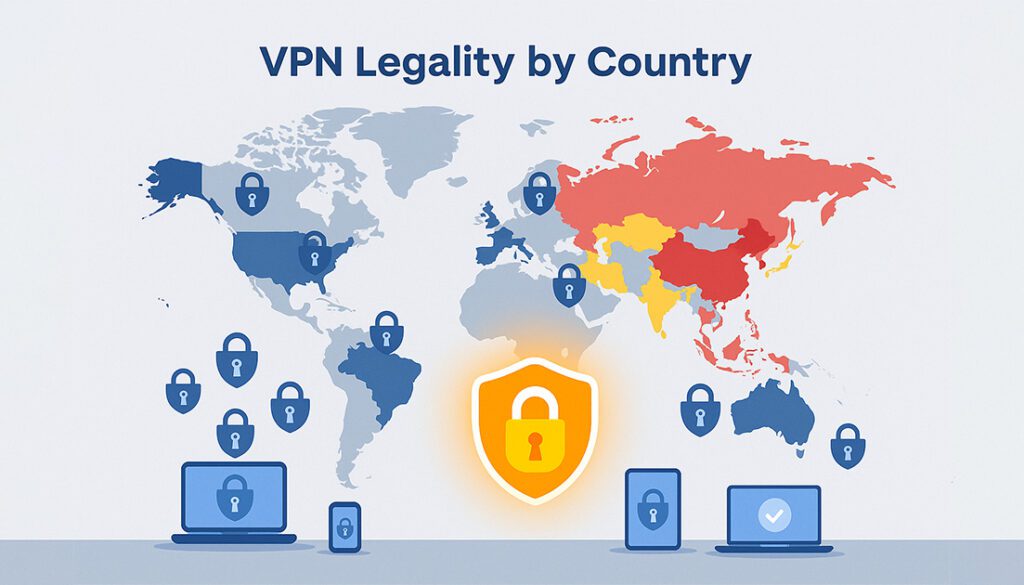
VPN legality varies greatly by country. While most nations allow VPN use for privacy and security, others impose restrictions and a few outright ban them.
Below is a summary of countries where VPN are either banned, heavily restricted, or monitored. Keep in mind, laws can change quickly, and enforcement may vary.
| Country | Status | Details |
|---|---|---|
| China | Restricted | Only government-approved VPNs allowed. Most commercial VPNs are blocked. |
| Russia | Restricted | VPNs must block access to banned content or face fines. |
| Iran | Banned | Only state-licensed VPNs permitted; others are criminalized. |
| United Arab Emirates | Restricted | VPNs are legal, but using them to bypass censorship or commit crimes can lead to fines or jail. |
| North Korea | Banned | Total internet control. VPN use is illegal and severely punished. |
| India | Restricted | New regulations require VPN providers to store user data, leading some VPNs to exit the market. |
🧠 Summary
VPN use is legal in most parts of the world, but several countries impose controls ranging from content filtering to full criminalization. These bans are usually aimed at curbing dissent, blocking foreign influence, or protecting economic interests.Before traveling or relocating, always check the current laws in your destination. Using a VPN in a restricted region may carry real consequences, including heavy fines or jail time in extreme cases.
How Are VPN Bans Enforced? (And Can They Be Bypassed?)
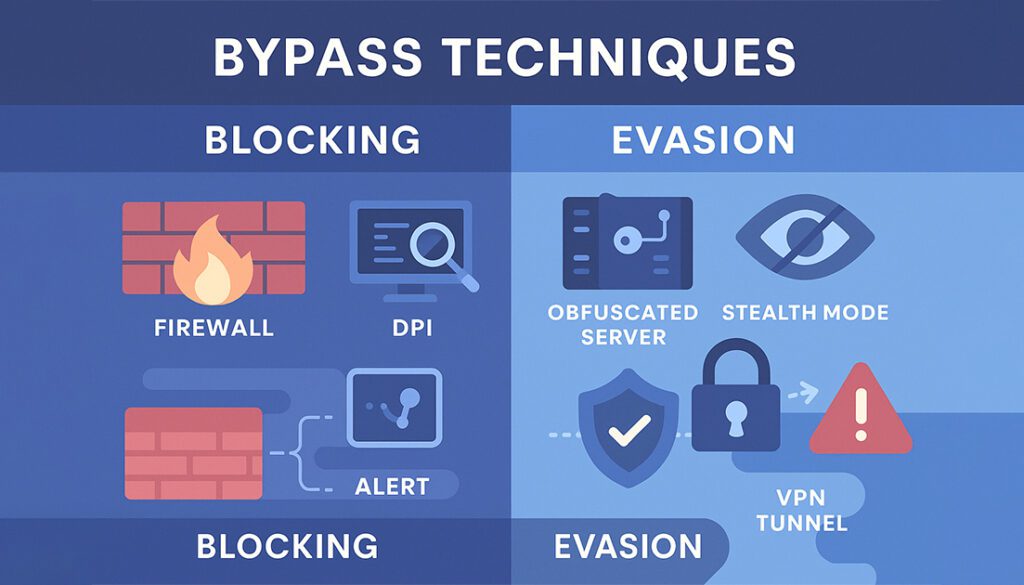
When a government decides to restrict VPN usage, it doesn’t always rely on direct arrests or fines. In many cases, technical enforcement methods are used behind the scenes to make VPNs difficult or impossible to use.
🔍 Common VPN Ban Enforcement Tactics
- IP blocking: Known VPN server IPs are added to national blocklists.
- Deep Packet Inspection (DPI): Governments analyze internet traffic to detect and disrupt VPN protocols like OpenVPN or WireGuard.
- DNS filtering: VPN websites are blocked, making it harder for users to download apps.
- App store pressure: Countries like China often force Apple or Google to remove VPN apps from their local app stores.
- ISP throttling or blacklisting: Internet providers may block or slow VPN traffic directly.
🚧 Can You Bypass a VPN Ban?
Yes, but it depends on how advanced the blocking is and how tech-savvy the user is.
Some of the most effective methods to bypass VPN restrictions include:
- Obfuscated servers or stealth VPNs: These disguise VPN traffic as regular HTTPS traffic.
- Shadowsocks or SOCKS5 proxies: Lightweight alternatives used to sneak past censorship filters.
- Tor bridges: Help users access the Tor network even when it’s blocked.
- Changing protocols: Switching from OpenVPN to WireGuard or IKEv2 may help avoid detection.
While bypassing VPN blocks is often possible, it may be illegal in certain countries. Always weigh the risks before attempting to circumvent government restrictions.
🚧 How VPNs Are Blocked (and How Users Fight Back)
Enforcement: IP blacklists, DPI, DNS filtering, app removals, ISP throttlingBypass Tools: Obfuscation, Shadowsocks, Tor bridges, protocol switching
Is It Illegal to Use a VPN in Those Countries?
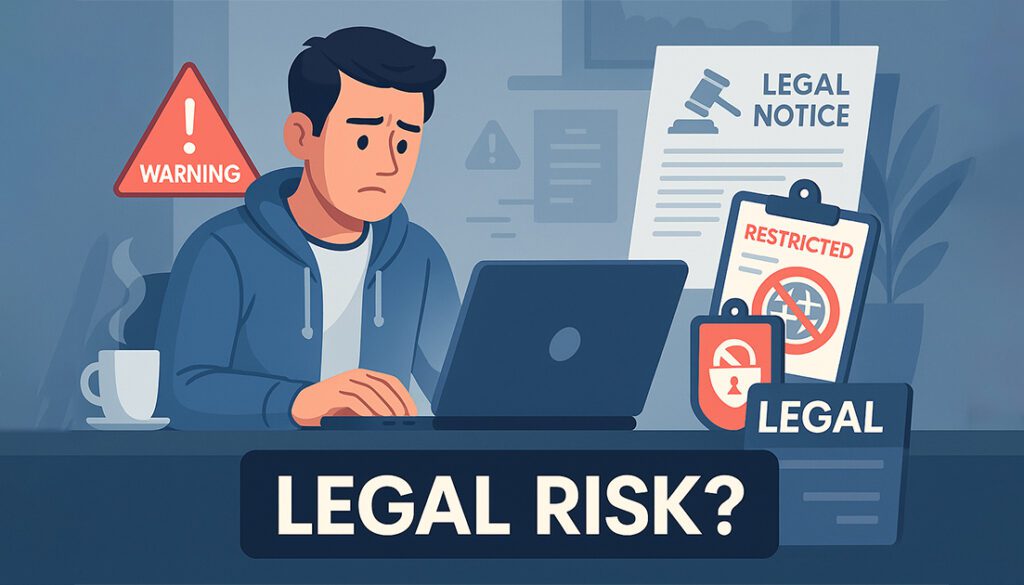
Just because a country restricts or blocks VPNs doesn’t always mean it’s illegal to use them. In many places, VPNs exist in a legal gray area technically allowed, but practically discouraged or closely monitored.
🟡 Countries Where VPN Use Is Limited but Not Illegal
In places like the UAE, Russia, or India, VPNs are technically legal. However, using them for “unlawful purposes”, such as accessing banned websites or VoIP services can lead to heavy fines or criminal charges.
🔴 Countries Where VPNs Are Outright Illegal
In North Korea and Turkmenistan, using a VPN is fully prohibited. In Iran and China, only government-approved VPNs are legal. Using any other service is treated as a criminal offense and could result in penalties.
⚠️ The Legal Risk Depends on:
- The country’s censorship and surveillance laws
- Whether the VPN is approved by the state
- How you’re using the VPN (browsing, streaming, activism, etc.)
Even in countries where VPNs are legal, your usage can still violate local laws. For example, streaming foreign media or communicating anonymously during protests.
⚖️ Is VPN Use Illegal?
🔴 Totally banned: North Korea, Turkmenistan🟠 Legal only with government-approved providers: China, Iran
🟡 Legal but risky depending on use: UAE, Russia, India
🟢 Legal with no major restrictions: Most Western and democratic countries
Are VPN at Risk of Being Banned Globally?
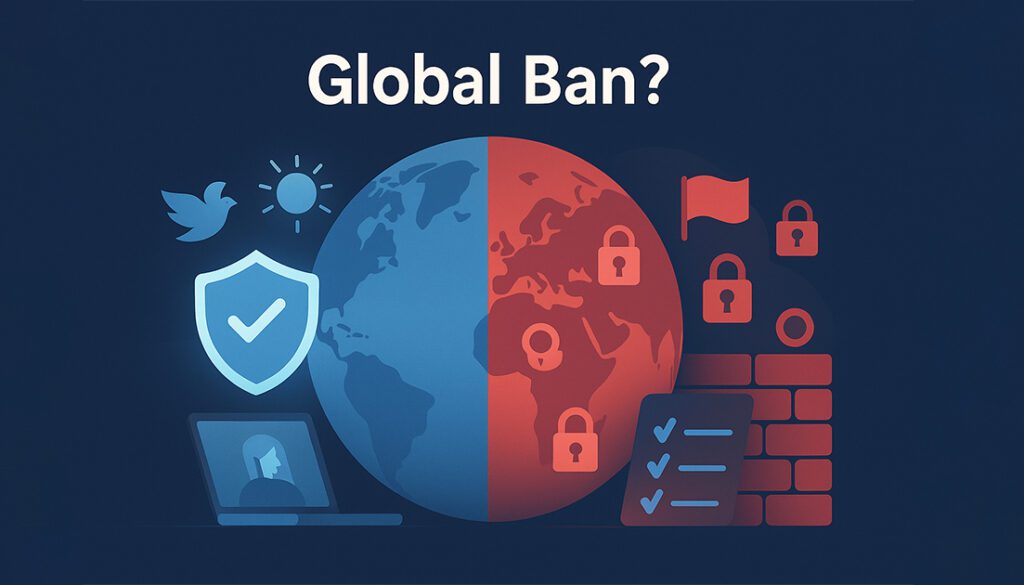
While VPN bans are increasing in some countries, a global ban on VPNs is highly unlikely. In fact, in many parts of the world, VPNs are encouraged, especially for cybersecurity, remote work, and data protection.
🌎 VPNs Are Essential in Most Countries
Governments, businesses, and individuals rely on VPNs to:
- Secure remote work connections
- Protect against cyberattacks and identity theft
- Comply with data protection laws like GDPR
- Access region-specific services for legitimate reasons
In democratic countries, banning VPNs would conflict with privacy rights and damage the tech economy.
🚨 But VPN Restrictions Are Growing Elsewhere
In authoritarian regimes, the trend is different. Countries like Russia, China, Iran, and others continue to:
- Expand internet surveillance
- Pressure VPN providers to comply with censorship rules
- Criminalize unauthorized use of encryption or anonymity tools
The more governments crack down on dissent or control digital access, the more likely they are to restrict VPN usage.
📈 What the Future Looks Like
Instead of a global ban, expect a deeper divide:
- Free societies will protect VPN use as a privacy right
- Authoritarian states will continue to clamp down or regulate VPN traffic
Users should stay informed about local laws and choose VPN providers that support open internet access and transparency.
🌍 VPN Ban Outlook
🟢 Most countries: Supportive of VPNs for cybersecurity and remote work🟠 Select regions: Restrict usage through regulation and censorship
🔴 Authoritarian states: Continue to block, monitor, or criminalize VPN access
How to Use a VPN Safely in High-Risk Regions
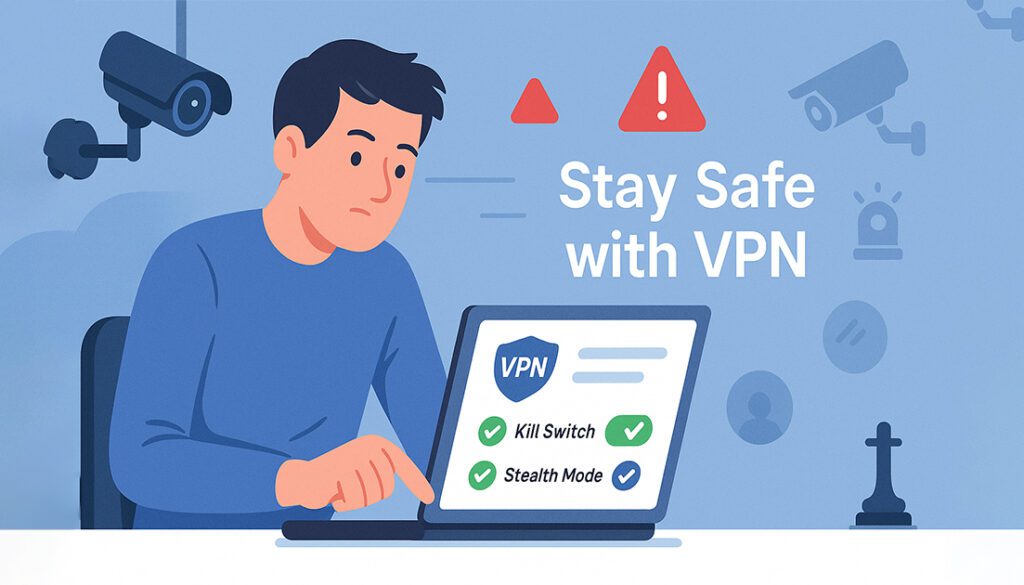
Using a VPN in countries where it’s banned or restricted can be risky, but it’s not impossible. If you live in or travel to a high-censorship country, you need to take extra precautions to avoid detection and stay secure.
🧠 Best Practices for Safer VPN Usage
- Choose a provider with obfuscation or stealth modes
These make VPN traffic look like regular HTTPS, helping bypass deep packet inspection (DPI). - Use RAM-only servers and no-logs policies
RAM-based servers erase all data after each session, leaving no trace if seized. - Stick to trusted protocols like WireGuard or OpenVPN
Avoid outdated protocols (like PPTP) which are easier to detect and block. - Enable the kill switch and leak protection
These stop your real IP or DNS from leaking if the VPN connection drops. - Avoid VPN apps from app stores in censored regions
Instead, download the software before entering the country, and keep a backup copy offline. - Know the legal limits
Even if you bypass blocks, the act itself could still carry penalties. Stay informed and cautious.
🛡️ VPN Safety Tips for Censored Countries
✅ Use stealth or obfuscated servers✅ Choose VPNs with RAM-only + no-logs policies
✅ Avoid outdated protocols like PPTP
✅ Enable the kill switch and DNS leak protection
✅ Download apps before entering restricted regions
❓ Frequently Asked Questions
Is it illegal to use a VPN in China?
Using a non-government-approved VPN in China is technically illegal. While enforcement varies, accessing foreign content or bypassing the Great Firewall with unlicensed VPNs can lead to penalties.
Can a VPN be banned in democratic countries?
It’s unlikely. In most democratic countries, VPNs are protected under privacy rights and are commonly used for security and remote work. However, VPN misuse can still be subject to legal action.
What happens if you use a VPN in a banned country?
Consequences vary. You might face internet disconnection, fines, or even legal action, especially in countries like Iran, UAE, or North Korea. Enforcement depends on local laws and usage intent.
Can governments detect VPN usage?
Yes. Governments can detect VPN traffic using deep packet inspection (DPI) or by monitoring known VPN IP addresses. However, obfuscated VPNs can disguise traffic to look like regular HTTPS.
Are VPN apps blocked in some regions?
Yes. Countries like China and Russia often force app stores to remove VPN apps, making them harder to access locally. It’s best to download your VPN before entering these regions.
Which VPNs work in high-censorship countries?
VPNs with stealth or obfuscation modes, like NordVPN (with Obfuscated Servers) or ExpressVPN (with Lightway and stealth), are designed to bypass censorship in places like China, Iran, and Russia.
Final Thoughts
So, can VPN be banned? Absolutely and in some countries, they already are. But in most parts of the world, VPNs remain legal and widely used for privacy, security, and unrestricted access.
If you’re in a region with VPN restrictions, knowing the rules and using the right tools can make all the difference. Choose a trustworthy VPN provider, understand your local laws, and always prioritize safety.
The open internet is worth protecting and VPNs are one of the best tools we have to do that responsibly.
Need a VPN That Works Where Others Don’t?
Not all VPNs can bypass censorship or survive government blocks. We’ve tested the top VPNs that offer stealth modes, no-logs policies, and strong encryption — perfect for high-risk regions.
View Our Top VPN Recommendations
